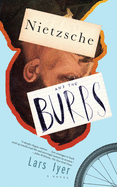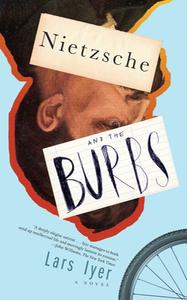
 Lars Iyer (Wittgenstein Jr.) makes nihilist philosophy hip and fun in his highly entertaining tragicomedy Nietzsche and the Burbs.
Lars Iyer (Wittgenstein Jr.) makes nihilist philosophy hip and fun in his highly entertaining tragicomedy Nietzsche and the Burbs.
The novel introduces a group of disaffected teenagers finishing their last year of secondary school before heading out into the big, uncaring world: Art, Merv, Paula and the narrator, Chandra. The foursome inducts into their clique a new student, whom they nickname Nietzsche due to his gloomy disposition and pessimistic outlook on life. They sense he is intellectually superior, perhaps braver, and thus look up to him as a kind of leader. The four get him to front their rock band, called Nietzsche and the Burbs, believing music can save them from the banality of life. For his part, Nietzsche plays in the band--though not as enthusiastically as his friends would like--and spends most of his time developing a philosophy of the suburbs, posting on his blog about his conclusions while participating in the parties and the general hullabaloo of high school.
Iyer writes in short, emphatic elliptical sentences, a little maddening in their repetition but effective in creating a mood of rebellious adolescence. The style works in portraying the young characters' molten thoughts and emotions, as well as in satirizing the suburbs and school life. The group lives and studies in a suburban English town aptly named Workingham, which comes to symbolize the "hangover of history," the final phase of humanity distinguished by a nauseating sameness. As much fun as Iyer has in hilariously sending up tract houses and golf courses, he's at his satirical best describing the social stratification in the school. It's not the jocks or the "beasts" that rule the day, but rather the "drudges," those complacent, phone-addicted students who seem to have succumbed entirely to first-world mediocrity.
There's something daring and poetic in the main characters' resistance to suburban culture. They take drugs, they read books, and they play music that defies categorization. In their nihilism, they talk about affirming their lives in a significant way, through art, through suffering. Iyer brings Nietzschean philosophy to heady, raucous life, fleshing out the ideas of nihilism and existentialism in ways that few books do. The characters don't just talk philosophy; they embody it in their decisions and actions. They test their surroundings with radical ideas. It's an exhilarating ride, evoking the grandiosity of youth and the dynamics of counterculture itself. Of course, there's a tragic arc to the story. Beneath every uproarious protest cry is something human and fallible, Iyer sharply reminds readers.
The brilliant, relentless drive of the narrative of Nietzsche and the Burbs demands a certain amount of stamina from readers. But the payoff is great. Perhaps not since Don DeLillo's White Noise has a novel so funnily and savagely lifted the veil on Western postmodern culture. What's underneath is hard to explain. Some may find darkness, others beauty. --Scott Neuffer, writer, poet, editor of trampset
Shelf Talker: Lars Iyer explores philosophical ideas through a band of misfit adolescents in this intellectually thrilling and hilarious novel.

